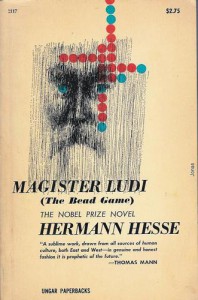 by Phil Soucheray, Visitation Companion
by Phil Soucheray, Visitation Companion
I just got done reading Hermann Hesse’s “The Glass Bead Game.” Until a few weeks ago I had never heard of the book. I did not know that it was the final full-length novel by this noted German writer. Heck, he won the Nobel Prize for the darn thing back in 1946.
How did this one slip by me? If the book isn’t on the shelves of the library at the Visitation Monastery in Minneapolis, it should be. (Hint, hint).
“..what sets the Visitation Community apart and continues to attract me to them is that their objective is not simply in fostering a life of the mind, but fostering it in way that reflects the greater glory of God.”
The setting is somewhere in Europe, perhaps sometime in the 25th century, at a time when the life of the mind has been elevated by society to almost religious significance. An entire church-like province has been established and is dedicated to study of arts and culture. “The Game,” which involves players delving into all recorded knowledge around a selected topic and showing connections between apparently disparate disciplines, is considered the peak and pinnacle of man’s creative spirit.
The story is presented as a biography of the man, Joseph Knecht, and relates his personal conflict as he comes to be aware that the life of the mind is empty unless the fruits of it are used to positively influence the course of human relationships.
If you have stayed with me this far and you are graced to have an appreciation for the Sisters of the Visitation Monastery of Minneapolis, that last paragraph hopefully will resonate with you. To my way of thinking, this community of contemplative monastics in the inner-city represents the pinnacle of efforts to synthesize the life of the mind with positively influencing the world.
But what sets the Visitation Community apart and continues to attract me to them is that their objective is not simply in fostering a life of the mind, but fostering it in way that reflects the greater glory of God. God is the peak and pinnacle. They seek a unity of life, heart and mind with God, so that God can be reflected by them into the world.
I found myself thinking about the nuns and my spiritual life often while reading “The Glass Bead Game.” I was particularly struck by how Hesse’s representation of pursuing the life of the mind parallels my understanding of how to pursue life in the spirit; specifically, the necessity of contemplation and meditation in both.
This was highlighted for me in Hesse’s book by one particular scene. In it, Knecht has shared with a beloved master that he is antsy and seeking to gain his freedom from the rigors of the monastic-like life represented by the intellectual province. The esteemed teacher understands, going so far as to tell a story of his own bit of straying as a youth.
The beauty of his ultimate lesson is not one of chastisement, but one of encouragement. He reminds Joseph that the life of the mind is worthy, but cannot be the end all. It must be balanced with meditation; which in the context of the sisters I translate to mean contemplation focused on God.
It becomes easy to let the practice become an afterthought. So, what I hear my inner voice saying to me is, “Just do it!”
0 Comments